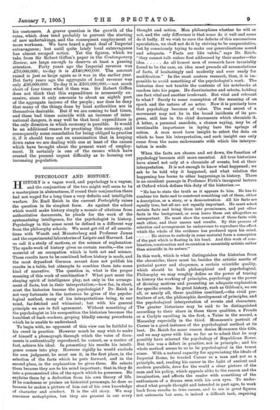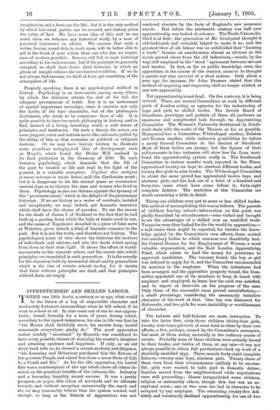PSYCHOLOGY AND HISTORY. H ISTORY is a vague word, and psychology
is a vaguer, and the conjunction of the two might well seem to be a masterpiece in abstractness, if round their conjunction there had not waged for a long time a very definite and intelligible warfare. Dr. Emil Reich in the current Fortnightly raises the question in its simplest form. As against the school which would make history simply a mosaic of citations from authoritative documents, he pleads for the work of the systematising intelligence, for the psychologist in history. Psychology in this sense must be defined in a different way from the philosophy schools. We must get rid of all associa- tions with Wundt and Munsterberg and Professor James and the experimental laboratories of Leipsic and Harvard. Let us call it a study of motives, or the science of explanation. The spade-work of history gives us certain results,—the raw material of an occupation which is both art and science. These results have to be combined before history is made, and the most dryasdust German savant does not publish his results in a table, but attempts to combine them into some kind of narrative. The question is, what is the proper meaning of this work of combination ? What part must the shaping spirit of intelligence play, not only in the arrange- ment of facts, but in their interpretation,—how far, in short, must the historian become the psychologist ? Dr. Reich is not very fortunate in the instances he gives of the psycho- logical method, many of his interpretations being, to our mind, far-fetched and whimsical ; but with his general principle we are in full agreement. Without something of the psychologist in his composition the historian becomes the humblest of hack-workers, groping blindly among precedents which he is unable to understand.
To begin with, no opponent of this view can be faithful to his creed in practice. However much he may wish to make of himself a phonograph through which the voice of docu- ments is authentically reproduced, he cannot, as a matter of fact, achieve his ideal. In presenting his results his intelli- gence comes into play. However rigidly he would exclude
his own judgment, he must use it, in the first place, in the selection of the facts which he puts forward, and in the second place, in the explanation he gives them. He selects them because they are to his mind important; that is, they fit into a preconceived idea of the epoch which be possesses. He explains them by a deduction from his own theory of life. If he condemns or praises an historical personage, he does so because he makes a picture of him out of his own knowledge of character and conduct. It is the old story. We may renounce metaphysics, but they are present in our every
thought and action. Man philosophises whether he will or not, and the only difference is that some do it well and some do it badly. If we wish to cure the defects of this unconscious speculation, we shall not do it by striving to be unspeculative, but by consciously trying to make our generalisations sound and adequate. "Facts are like valets," says Dr. Reich, "they cannot talk unless first addressed by their master—the
idea. As all honest men of research have invariably found to be the case, an idea must precede all accumulations of facts, if hesitatingly and modestly and ever ready for modification." In the most austere research, then, it is im- possible to avoid something of the psychologist's work. The historian does not tumble the contents of his notebooks at random into his pages. He discriminates and selects, holding one fact vital and another irrelevant. But vital and relevant to what ? Surely to some conception of the meaning of an epoch and the nature of an actor. Now it is precisely here that psychology becomes of value. The real secret of a movement may not lie in the broad incidents of its pro- gress, still less in the chief documents which chronicle it. A letter, a personal anecdote, a chance saying, may be of inestimable importance in laying bare the springs of action. A man must have insight to select the data on which to base his interpretation, and such insight can only come from the same endowments with which the interpre- tation is made.
When the facts are chosen and set down, the function of psychology becomes still more essential. All true historians have aimed not only at a chronicle of events, but at their interpretation. It is not enough to know what happened ; we ask to be told why it happened, and what relation the happening has borne to other happenings in history. There is an excellent passage in Professor Firth's inaugural lecture at Oxford which defines this duty of the historian :—
"He has to state the truth as it appears to him. He has to combine his facts and to construct something out of them, either a description, or a story, or a demonstration. All his facts are equally true, but all are not equally important. He must select certain facts and bring them into prominence, and put other facts in the background, or even leave them out altogether as unimportant. He must show the connexion of these facts with each other, and their causes and results. By this process of selection and arrangement he endeavours to reproduce the effect which the whole of the evidence has produced upon his mind.
He strives to embody in some material form a conception of the past which is floating in his head. And this work of com- bination, construction and re-creation is essentially artistic rather than scientific in its nature."
In this work, which is what distinguishes the historian from the chronicler, there must be, besides the artistic merits of pictorial power and eloquence, a certain scientific quality, which should be both philosophical and psychological. Philosophy we may roughly define as the power of tracing in history the working of principles, psychology as the power of divining motives- and presenting an adequate explanation for specific events. In great history, such as Gibbon's, we see all, or nearly all, these qualities combined,—the vivid por- traiture of art, the philosophic development of principles, and the psychological interpretation of events and characters. The greater historians may be said to be distinguished according to their share in these three qualities, a Fronde or a Carlyle excelling in the first, a Taine in the second, a Macaulay especially in the third. Mommsen's portrait of Caesar is a good instance of the psychological method at its best. Dr. Reich for some reason denies Mommsen this title, and we may agree with him so far as to admit that he may possibly have misread the psychology of Republican Rome, But this was a defect in practice, not in principle ; and hie whole method seems to us to be psychological in the truest sense. With a natural capacity for appreciating the ideals of Imperial Rome, he treated Caesar as a man and not as a principle, and, reading his career in the light of ancient and modern parallels, drew for the world a clear picture of the man and his policy, which appeals alike to the reason and the imagination, and affects the reader with something of the enthusiasm of a drama seen with his own eyes. To under- stand what people thought and intended in past ages, to work back from results to true causes, and to see in great figures not automata but men, is indeed a difficult task, requiring
the value of fact. We have some idea of this sort in our mind when we welcome any historical study by a man of practical experience in affairs. We assume that such a writer, having sound data to work upon, will be better able to get at the heart of past action than one who has no experi- ence of modern parallels. Success will fall to each historian according to his endowments; but if the principle be generally Accepted, we shall have fewer dead histories, in which no gleam of insight relieves the mechanical erudition. If we do not always find success, we shall at least get something of the atmosphere of life.
Properly speaking, there is no psychological method in history. Psychology is an instrument, among many others, by which the historian attains the end of his toil, the adequate presentment of truth. But it is an instrument of special importance nowadays, since it corrects not only the faults of the bare chronicler, but of the philosophic -doctrinaire, who tends to be commoner than of old. It is quite possible to have too much philosophy in history, and to find, instead of a living, breathing world, a cold nexus of principles and tendencies. On such a theory, the actors are mere puppets, races and nations move like automata pulled by the string of this or that economic or political or religious doctrine. Or we may have history written to illustrate some grandiose metaphysical idea of development, such as Hegel's, which found the Divine Will realised in its final perfection in the Germany of 1840. To such heresies, psychology, which demands that the life of the past be treated as life and read in the light of the present, is a valuable corrective. Cogitavi dies antiques et annos aeternos in mente habui, said the Carthusian monk ; but it is dangerous to let the eternal years so overshadow ancient days as to obscure the men and women who lived in them. Psychology is also our defence against the tyranny of the "proximate cause," which is the delight of the picturesque historian. If we see history as a series of accidents, isolated and inexplicable, we may, indeed, get dramatic narrative which shall have the charm of paradox. To see the reason for the death of James I. of Scotland in the fact that he had built up a grating down which the balls at tenths used to ran, and the cause of Napoleon's downfall in a piece of false news at Waterloo, gives, indeed, a kind of fantastic romance to the past. But it is not the truth, and therefore not history. The psychological point of view shows the historian the motives of individuals and nations, and sets the deeds which spring from them in their true light. It shows the effect of world. movements on the separate actors, and the accent into which principles are translated in each generation. It is the remedy for the obsession both by inessential detail and by generalities which is the vice of certain schools to-day, for it insists that facts without principles are dead, and that principles without facts are empty.















































 Previous page
Previous page